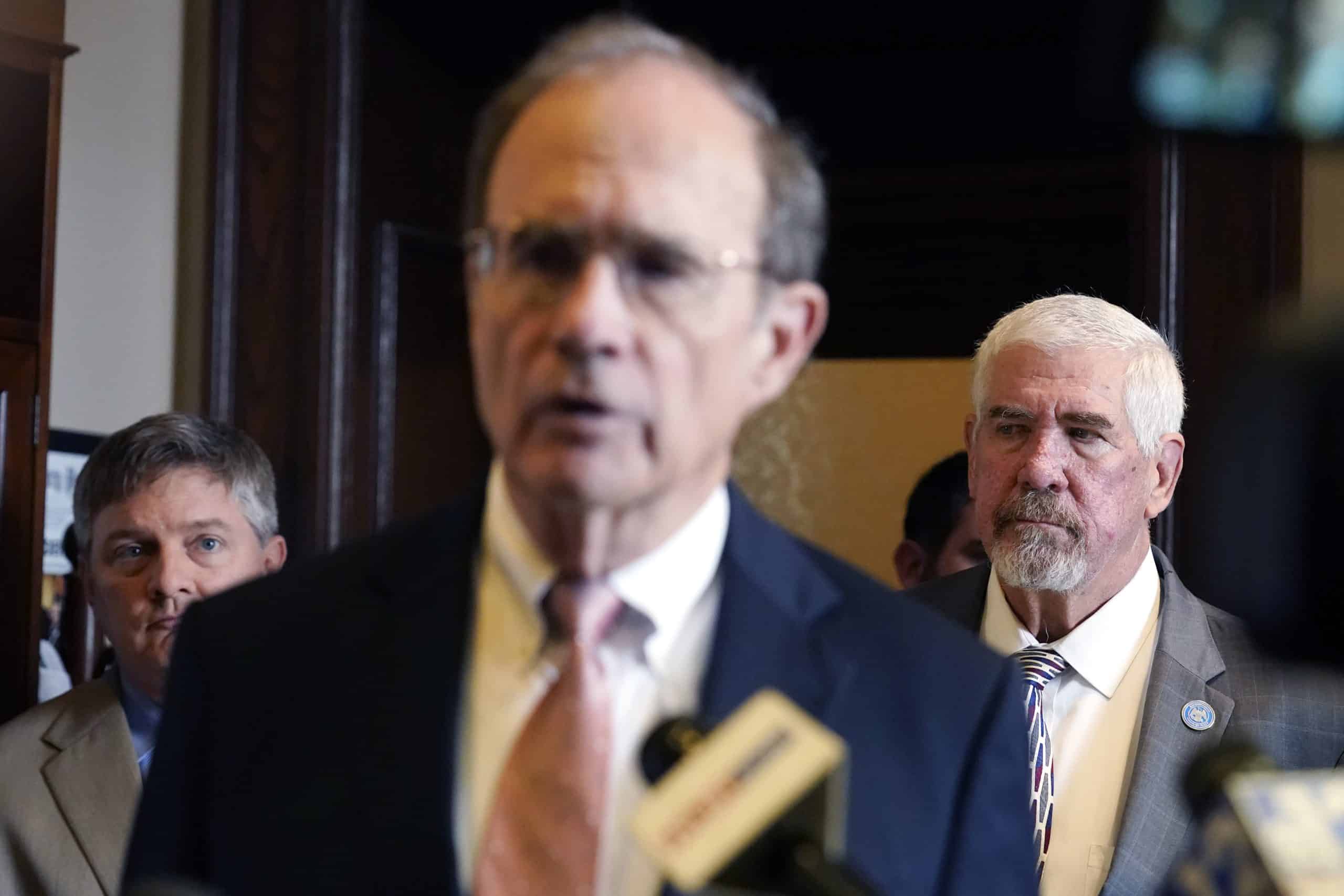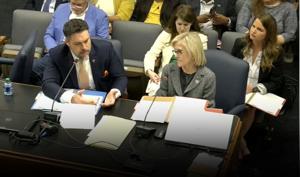Mississippi Today
Where’s the plan? Senate still has only ‘dummy bill’ for Medicaid expansion

Facing a Thursday deadline for passage, the state Senate leadership has refused to detail its Medicaid expansion plan, leaving members in the dark and health experts worried the plan could ultimately include elements that are unfeasible, costly and counterproductive.
Two-and-a-half months into the legislative session, and after 10 years of debate, Senate Medicaid Chairman Kevin Blackwell told Mississippi Today on Monday afternoon that there was no update on a Senate proposal to expand Medicaid eligibility to the working poor and said, “we’re still working on it.”
Two weeks after the House overwhelmingly passed a bill to expand Medicaid, the Senate has not brought the House measure up, even in committee, and Senate leaders refuse to comment on it.
The Senate expansion bill, which only has the necessary code sections to expand Medicaid with no details, passed committee the first week of March. But trying to have the full Senate pass such a “dummy bill” could prove counterproductive, with senators on the fence unlikely to support a bill they know nothing about.
Blackwell declined to elaborate whether he would advance the dummy bill for a floor vote, if he would let it die or if he planned to propose a substantive expansion plan before the Thursday deadline.
“You’ll just have to wait and see,” he said on Monday.
READ MORE: Gov. Tate Reeves privately tells senators he will veto any Medicaid expansion bill
The only detail Blackwell and Lt. Gov. Delbert Hosemann have confirmed about the plan is that it would contain a work requirement for new coverage recipients — a prerequisite which could kill the effort to expand the health program if the feds don’t approve it.
Members of the Senate have voiced concerns about supporting a skeletal bill without knowing what it might eventually contain.
Sens. Scott DeLano, R-Biloxi, and Daniel Sparks, R-Belmont, say they have never favored expansion, but not having a real bill in front of them doesn’t help the cause. If they were presented a real bill, they say, they would consider the policy.
“I’ve always been pragmatic. If you show me there’s a sustainable way to do something, I will listen,” DeLano said. “I am a compassionate person as well. I want to help people as much as we can. But show me where the sustainable funding will come from … I haven’t seen a bill. If you want me to support something — I haven’t seen a bill, we haven’t seen a bill yet.”
Sparks echoed the sentiment.
“I have not seen the language of the Senate Medicaid expansion plan,” Sparks said. “As I do with all legislation, though, I will review it, study it and ask questions about it.”
The only detail Blackwell has made public is that the bill would need to contain a work requirement, meaning enrollees would need to prove employment or exemption in order to be covered. That requires approval from federal Centers for Medicaid Services, which under the Biden administration has rescinded work requirements previously approved for other states during the Trump administration and has not approved new ones. Georgia remains in litigation with the federal government over the work requirement issue, and has suffered low enrollment and missed out on millions in federal funds by not expanding fully.
Even if a work requirement were approved, it would be costly to implement and could cause a host of administrative difficulties, resulting in loss of coverage even for employed individuals. To the extent that work requirements lead to lower-than-expected enrollment, certain economic benefits of expansion such as additional tax revenue would be muted, according to a March 2024 study conducted by The Hilltop Institute at the University of Maryland, Baltimore County.
Hilltop previously conducted a more comprehensive report on Medicaid expansion in Mississippi, which it presented to the House Medicaid committee in mid-February. During the panel, the researchers outlined how it would boost the economy, generate thousands of jobs and help struggling hospitals.
The work requirement study estimates that if Medicaid were expanded in Mississippi, the majority of enrollees would be either employed or exempt from employment due to disability or extenuating circumstances.
Under the Arkansas Works program, the state saw 45% of new enrollees were employed. Of those unemployed, over 75% were exempt, and only a small number were unemployed and not eligible for exemption.
Arkansas briefly had a Medicaid work requirement from 2018-2019. Research shows it did not lead to more people entering the workforce.
Furthermore, explained Morgan Henderson, Hilltop’s principal data scientist, the cost and administrative chore of implementing work requirements far exceeds the cost of insuring a small number of unemployed, non-exempt individuals along with the rest of the employed or exempt population.
“It would be very challenging to have a robust Medicaid expansion program with a work requirement,” Henderson said.
That’s because implementing work requirements would involve enrollees submitting proof of employment monthly. It would require more staff, and would “introduce substantial confusion among enrollees,” according to the study, which could mean that “if working individuals do not realize that they must report their work status, working enrollees may also lose coverage.”
And others might not even apply.
“There’s a lot of research to show that even seemingly very small paperwork barriers can prevent folks from signing up for health insurance,” Henderson said, “even very affordable health insurance, and so it will reduce uptake – work requirements – we know this for a fact.”
Georgia, the only state currently trying to implement work requirements, has a very low uptake. Georgia’s Department of Community Health had estimated the state would see 64,000 new enrollees from expansion, but as of Dec. 15, 2023, only 2,344 individuals were actively enrolled.
“Some people don’t have internet access,” Henderson explained, “some people just don’t complete the requirements for whatever reason, and so there are folks who are legitimately employed, who should be income-eligible, who would certainly be frozen out just because of the administrative confusion.”
Eligible enrollees who were deemed ineligible due to procedural errors would have to reapply, causing an even greater strain on a system that is already understaffed and backlogged. That’s due in part due to “unwinding,” the process in which state Medicaid divisions across the country have been reviewing their rolls for the first time in three years after the end of COVID-19 restrictions that prevented them from kicking people off.
“In this era of PHE unwinding, it would be extremely cumbersome, I think, to actually implement this work requirement in Mississippi,” Henderson said.
Per a 2019 GAO report, the administrative costs of implementing work requirements range from $6.1 million in New Hampshire to $271.6 million in Kentucky.
In addition to that, if CMS does not consider the Mississippi plan to be Medicaid expansion under the Affordable Care Act — as is the case with Georgia — the state would only receive its traditional share of federal funds for its program, instead of the increased incentive of 90% for states that expand. Georgia is only receiving 65.9% federal share under its “Georgia Pathways to Coverage,” missing out on the millions more of federal funds it would receive under true expansion.
The Mississippi House expansion bill, which passed 98-20 without discussion and now sits untouched in the Senate, calls for a work requirement but says the state’s Medicaid program will be expanded regardless of whether the federal government approves the requirement.
The Senate would have to pass its expansion bill Thursday — whether it’s a skeletal bill or full-fledged bill — to keep it alive.
If the bill dies or is not passed, the Senate could still take up the House bill.
This article first appeared on Mississippi Today and is republished here under a Creative Commons license.![]()
Did you miss our previous article…
https://www.biloxinewsevents.com/?p=340053
Mississippi Today
On this day in 1945, Richard Wright’s memoir was top-selling book in U.S.
April 29, 1945

“Black Boy,” Richard Wright’s memoir about his upbringing in Roxie, Mississippi, became the top-selling book in the U.S.
Wright described Roxie as “swarming with rats, cats, dogs, fortune tellers, cripples, blind men, whores, salesmen, rent collectors, and children.”
In his home, he looked to his mother: “My mother’s suffering grew into a symbol in my mind, gathering to itself all the poverty, the ignorance, the helplessness; the painful, baffling, hunger-ridden days and hours; the restless moving, the futile seeking, the uncertainty, the fear, the dread; the meaningless pain and the endless suffering. Her life set the emotional tone of my life.”
When he was alone, he wrote, “I would hurl words into this darkness and wait for an echo, and if an echo sounded, no matter how faintly, I would send other words to tell, to march, to fight, to create a sense of the hunger for life that gnaws in us all.”
Reading became his refuge.
“Whenever my environment had failed to support or nourish me, I had clutched at books,” he wrote. “Reading was like a drug, a dope. The novels created moods in which I lived for days.”
In the end, he discovered that “if you possess enough courage to speak out what you are, you will find you are not alone.” He was the first Black author to see his work sold through the Book-of-a-Month Club.
Wright’s novel, “Native Son,” told the story of Bigger Thomas, a 20-year-old Black man whose bleak life leads him to kill. Through the book, Wright sought to expose the racism he saw: “I was guided by but one criterion: to tell the truth as I saw it and felt it. I swore to myself that if I ever wrote another book, no one would weep over it; that it would be so hard and deep that they would have to face it without the consolation of tears.”
The novel, which sold more than 250,000 copies in its first three weeks, was turned into a play on Broadway, directed by Orson Welles. He became friends with other writers, including Ralph Ellison in Harlem and Jean-Paul Sartre and Albert Camus in Paris. His works played a role in changing white Americans’ views on race.
This article first appeared on Mississippi Today and is republished here under a Creative Commons Attribution-NoDerivatives 4.0 International License.![]()
The post On this day in 1945, Richard Wright's memoir was top-selling book in U.S. appeared first on mississippitoday.org
Note: The following A.I. based commentary is not part of the original article, reproduced above, but is offered in the hopes that it will promote greater media literacy and critical thinking, by making any potential bias more visible to the reader –Staff Editor.
Political Bias Rating: Centrist
This article focuses on the historical context of Richard Wright’s memoir, “Black Boy,” and its impact on American literature and race relations. It presents facts about Wright’s life and work without taking an overt political stance. The tone is primarily reflective and factual, detailing Wright’s literary achievements and his contributions to addressing racial issues in America. The language is neutral and descriptive, with no evident bias toward either side of the political spectrum. It does not push a specific ideological agenda but instead highlights historical and literary significance.
Mississippi Today
Trump appoints former Gov. Phil Bryant to FEMA Review Council as state awaits ruling on tornadoes
President Donald Trump has appointed former Mississippi Gov. Phil Bryant to the FEMA Review Council, which Trump has tasked to “fix a terribly broken system” and shift disaster response and recovery from federal to state government.
The appointment comes as Mississippi awaits a response from the Trump administration on whether it will approve Gov. Tate Reeves’ request for a federal disaster declaration for deadly tornadoes in mid-March. The federal declaration, which Reeves requested April 1, would allow families and local governments devastated by the storms to receive federal assistance. Trump recently denied a similar request for Arkansas.
Trump has said states should shoulder more of the burden for disaster response and recovery, and he and Homeland Security Secretary Kristi Noem have threatened to shut down the Federal Emergency Management Agency altogether.
“I am proud to announce the formation of the FEMA Review Council, comprised of Top Experts in their fields, who are Highly Respected by their peers,” Trump wrote on social media. “… I know that the new Members will work hard to fix a terribly broken System, and return power to State Emergency Managers, who will help, MAKE AMERICA SAFE AGAIN.”
Trump listed other members of the council, including Secretary of Defense Pete Hegseth and Govs. Greg Abbott of Texas and Glenn Youngkin of Virginia.
Bryant, a longtime political ally of Trump, on social media wrote he is, “Honored to receive this appointment …” and that “Unfortunately, we’ve earned a lot of experience with natural disasters and recovery in Mississippi. Let’s Make America Safe Again.”
Mississippi saw seven deaths and an estimated $18 million in destruction from multiple tornadoes on March 14-15, the same storm system that caused damage in Arkansas. The Mississippi Emergency Management Agency reported that 233 homes were destroyed across 14 counties, and hundreds more were damaged.
During the initial aftermath, Reeves told reporters he believed there was a “high likelihood” the state’s damages from the March tornadoes would meet the threshold for FEMA’s Individual Assistance, which provides direct payments to disaster victims.
The Trump administration’s FEMA has denied federal assistance for flooding in West Virginia, tornadoes in Arkansas and a storm in Washington state, and refused North Carolina’s request for extending relief after Hurricane Helene.
After Hurricane Katrina’s devastation in 2005, Mississippi received nearly $25 billion in federal relief spending, which state leaders have credited with saving the state from ruin and allowing communities and families to rebuild.
This article first appeared on Mississippi Today and is republished here under a Creative Commons Attribution-NoDerivatives 4.0 International License.
Note: The following A.I. based commentary is not part of the original article, reproduced above, but is offered in the hopes that it will promote greater media literacy and critical thinking, by making any potential bias more visible to the reader –Staff Editor.
Political Bias Rating: Center-Right
The content presents a fairly neutral tone but leans towards a center-right perspective, particularly in its framing of President Trump’s actions and the appointment of former Mississippi Governor Phil Bryant. It highlights the argument for more state-level responsibility in disaster management, a position typically associated with conservative views. The reference to the Trump administration’s denial of federal assistance to certain states, including Arkansas, aligns with a more fiscally conservative stance that prioritizes reducing federal intervention. However, the mention of the substantial federal aid Mississippi received after Hurricane Katrina adds a historical balance to the perspective, indicating that the piece does not fully align with extreme conservative views.
Mississippi Today
Chris Lemonis fired, national search underway for Mississippi State baseball
Not quite four years after guiding Mississippi State to a baseball national championship, head coach Chis Lemonis has been fired, effective immediately.
Assistant coach Justin Parker will serve as interim head coach for the remainder of the season.
Mississippi State made the announcement in a press release Monday afternoon.
“A change in leadership is what is best for the future of Mississippi State baseball,” State athletic director Zac Selmon said. “We have not consistently met the standard of success that our university, fans and student-athletes expect and deserve. I want to thank Coach Lemonis for his work and the time he gave to our program, including a national championship in 2021. We appreciate his efforts and wish him and his family all the best moving forward.”
A national search is underway to identify the program’s next head coach, Selmon said.
“In a team meeting moments ago, I expressed to our student-athletes the confidence we have in their abilities and the potential they have for the remainder of the season,” Selmon said. “I encouraged them to compete with pride, resilience, and intensity. With the hard work, preparation, and talent already within this group, we are committed to putting them in the best position to finish the season competing at the highest level.
“Mississippi State is the premier job in college baseball. The tradition, the facilities, the NIL offerings and the fan base are all second to none. Dudy Noble Field is the best environment in the sport, period.”
The current Bulldogs have a 25-19 record and are 7-14 in the SEC. Most recently, the Bulldogs lost two of three weekend games to Auburn, the nation’s 11th-ranked team. State has lost its last two SEC series and five of seven this season. The Bulldogs are currently No. 45 in the nation in ratings percentage index (RPI) and are in danger of not making the NCAA Tournament for the third time in four years.
Lemonis’ MSU teams won 232 games and lost 135 in his six-plus seasons. Hired by former MSU baseball coach and athletic director John Cohen from Indiana, Lemonis has an overall coaching record of 373-226-2.
“This program is built for success,” Selmon said. “Our history proves it, and our future demands it. We are one of only four programs in NCAA history to reach the College World Series in six consecutive decades. With 40 NCAA Tournament appearances, 12 trips to Omaha, 11 SEC regular season titles, and a national championship, our program has always been a national contender. That is the bar. We’re going to find a leader who will embrace that, elevate our program and compete for championships.”
This article first appeared on Mississippi Today and is republished here under a Creative Commons Attribution-NoDerivatives 4.0 International License.
Note: The following A.I. based commentary is not part of the original article, reproduced above, but is offered in the hopes that it will promote greater media literacy and critical thinking, by making any potential bias more visible to the reader –Staff Editor.
Political Bias Rating: Centrist
The content provided is a straightforward news report about the firing of a baseball coach, Chis Lemonis, following his achievement of winning a national championship. The information is factual and does not indicate any political leaning, ideology, or bias. It is neutral in tone and intent.
-

 SuperTalk FM7 days ago
SuperTalk FM7 days agoNew Amazon dock operations facility to bring 1,000 jobs to Marshall County
-

 News from the South - Missouri News Feed3 days ago
News from the South - Missouri News Feed3 days agoMissouri lawmakers on the cusp of legalizing housing discrimination
-

 Mississippi Today2 days ago
Mississippi Today2 days agoDerrick Simmons: Monday’s Confederate Memorial Day recognition is awful for Mississippians
-

 Mississippi Today5 days ago
Mississippi Today5 days agoStruggling water, sewer systems impose ‘astronomic’ rate hikes
-

 News from the South - Georgia News Feed7 days ago
News from the South - Georgia News Feed7 days agoOrganization files ethics complaint against Warnock | Georgia
-

 News from the South - West Virginia News Feed5 days ago
News from the South - West Virginia News Feed5 days agoIs West Virginia — and the rest of the country — prepared to care for our seniors?
-

 Mississippi Today5 days ago
Mississippi Today5 days agoParents, providers urge use of unspent TANF for child care
-

 News from the South - Arkansas News Feed7 days ago
News from the South - Arkansas News Feed7 days agoOp-Ed: Another dismal year for ranked-choice voting | Opinion




















































